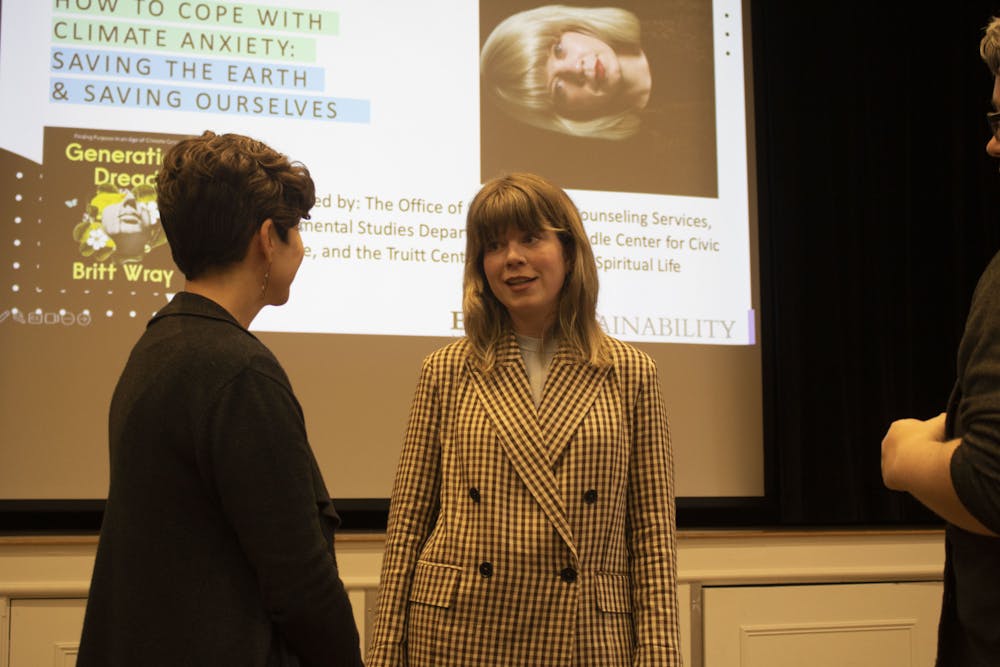Updated as of 11:37 a.m. on April 26 to include a student perspective of the event.
Britt Wray, author of “Generation Dread: Finding Purpose in the Age of Climate Anxiety,” spoke to Elon University on April 24 as the 2024 keynote speaker for Earth week.
Wray began by linking the idea that major fossil fuel companies, powerful lawyers and lobbyists choose to ignore damages inflicted by businesses. These efforts, according to Wray, have hindered people from taking action to stop them — which Wray deemed a global crime scene.
She said by 2070, an estimated 19% of the planet will be inhabitable due to increases in global warming. The increase in temperature can affect not only physical health, but also mental. Further, Wray presented data gathered by her and her colleagues that identifies children as the most affected by climate change mentally.
Having surveyed 10,000 teenagers and young adults across 10 countries from ages 16 to 25, Wray found tangible, negative consequences of the climate crisis on mental health. .
“45% of young people globally report their thoughts and feelings about the climate crisis are interfering with daily life tasks,” Wray said.
In addition, 75% of young people reported they feel their future is frightening — with 56% feeling humanity is doomed.
Despite this, Wray said that climate anxiety should not be seen as a mental health illness — but rather as climate compassion.
“It also means we are healthy and awake and connected to reality, and not numbed by unconscious defenses,” Wray said. “We can feel proud about that.”
Freshman Tyler Strenk attended the event and said he thought it was enlightening.
“I think she gave great opportunities and steps we can take, which I think is good,” Strenk said.
Wray further broke down how climate change impacts mental health in three ways: direct and indirect stressors, physical health and awareness.
Direct and indirect stressors can include coping with natural disasters that are linked to causing clinical anxiety and depression. Physical health is put into the mix, because high levels of stress and anxiety can cause people to become more prone to getting sick. Lastly, Wray linked awareness to doom scrolling, excessive consumption of news content, by saying how hearing and seeing the bad news about climate change can affect the community.
“It can become so overwhelming that it impairs our mental health,” Wray said. “It’s been linked to panic attacks and sleep problems and eating disorders, and even suicidality.”
According to Wray, one of the biggest things one can do to combat climate anxiety is to strengthen social capital. Social capital is the idea that people can achieve shared goals with those around them, which can be achieved by being involved in the community and strengthening social relationships.
“It lets us rebuild faster through those social relationships, but also ends up having statistically lower PTSD, anxiety, depression, suicidality amongst people who have this social network to tap into,” Wray said.
Other methods to help cope with climate anxiety include finding like-minded people to feel less alone, advocating for change and taking breaks from thinking about climate change to foster temporary relaxation.
“Taking breaks from the urgency of the climate crisis in order to engage in self care, and this is absolutely critical,” Wray said.
Through practicing these tactics, Wray said people of the world are able to tackle the climate crisis in a healthy way and still “remain caught up with the mission of doing the work.”
Wray concluded her discussion by proclaiming that the world needs more than hope to fix the climate crisis.
“We need a much deeper kind of hope in the climate crisis because our dominant culture has an obsession with easy hope, but there is no easy hope to be found here,” Wray said.


